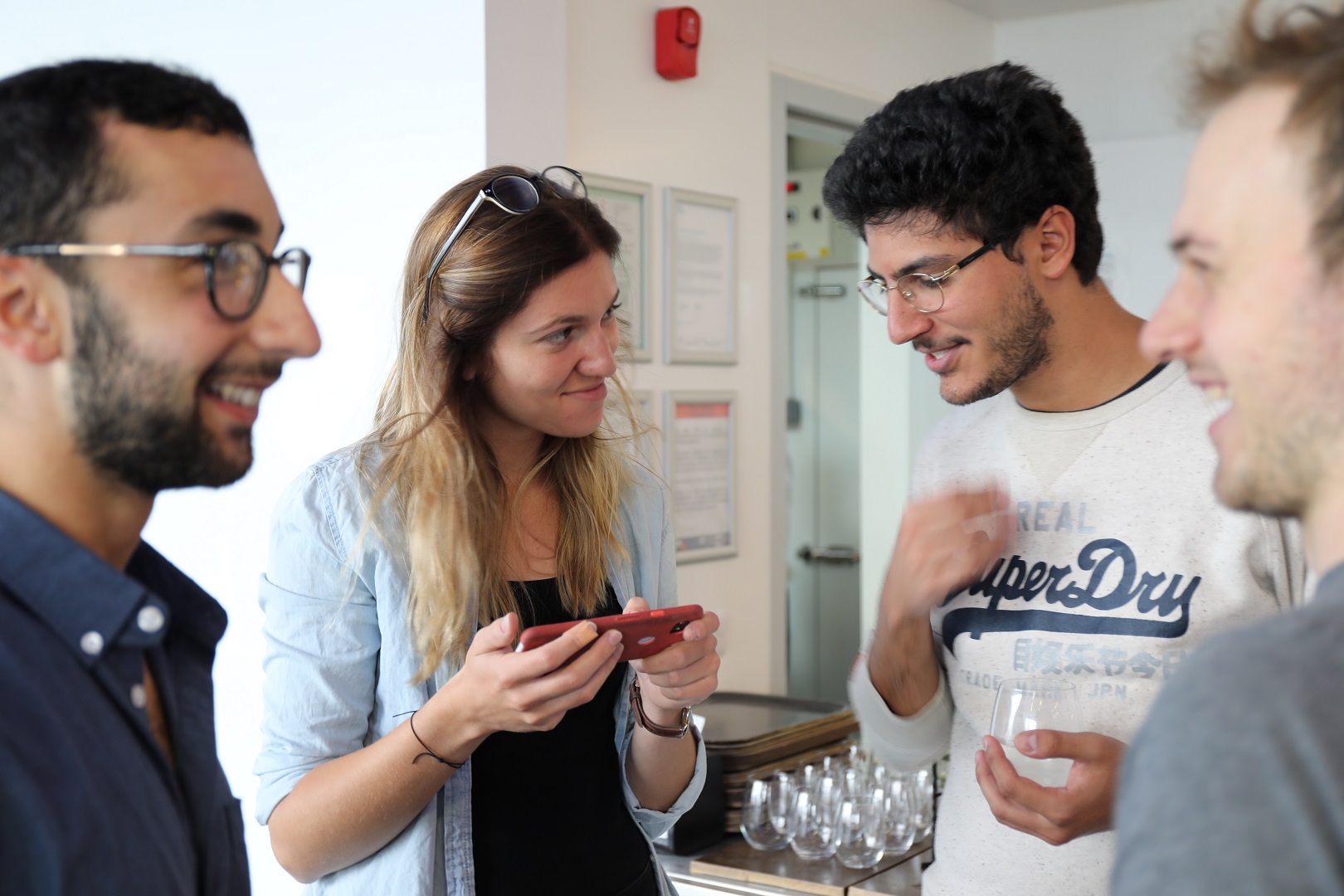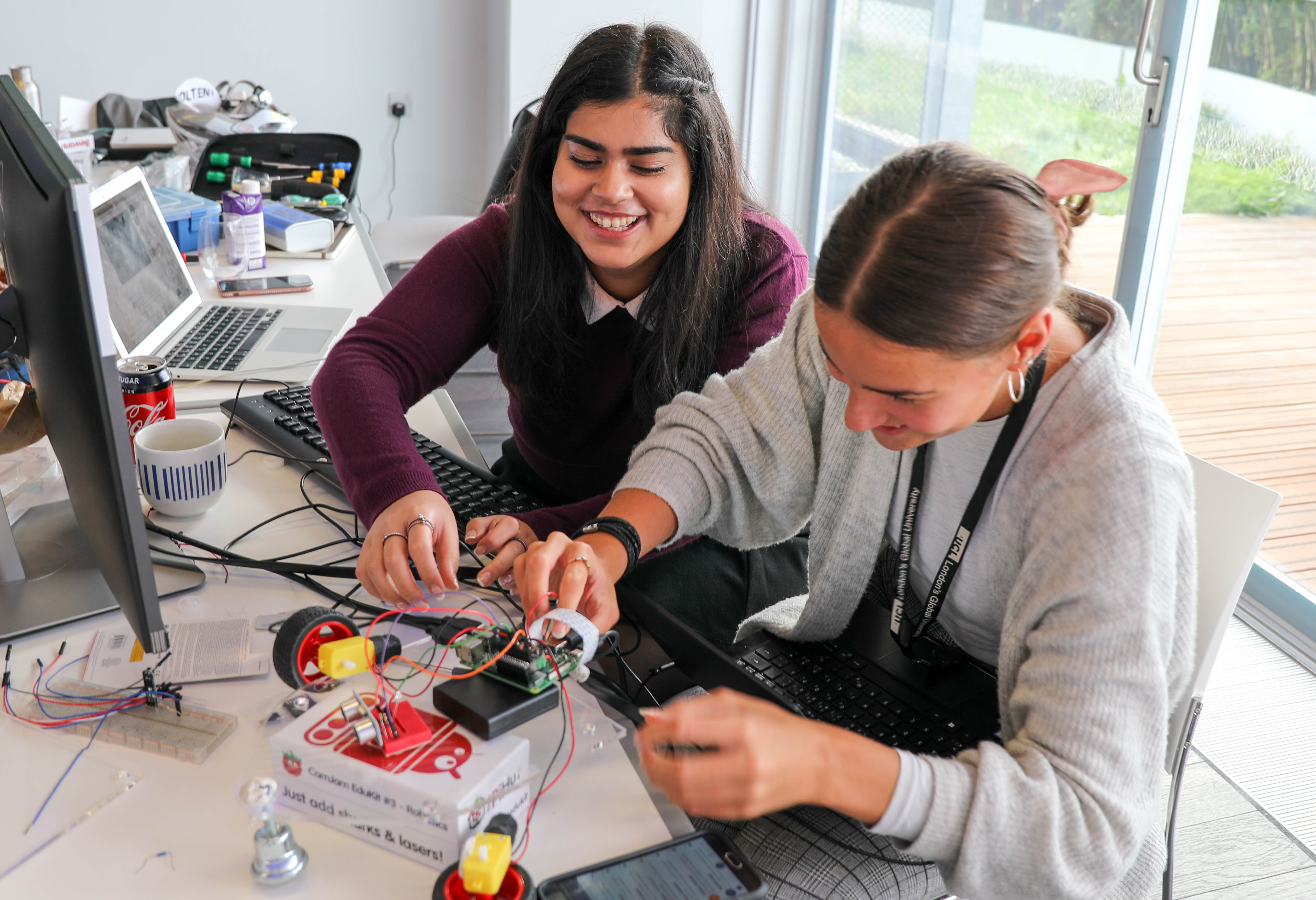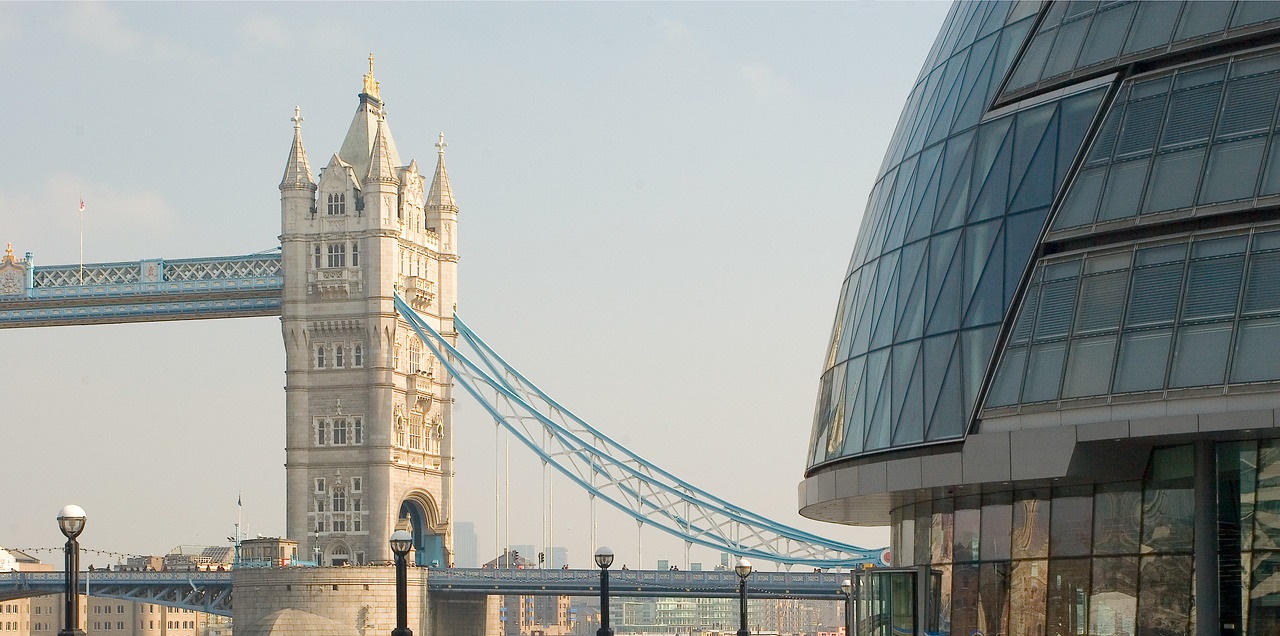
Why study at SWC?
Joining the SWC PhD Programme gives you the opportunity of doing your PhD at one of the outstanding systems neuroscience labs at the SWC.
In addition, our students receive a comprehensive introduction to systems neuroscience, as well as intensive training in experimental techniques, including imaging, physiology, molecular, and behavioural methods in systems neuroscience.
Students in the programme are taught and supervised by SWC faculty together with colleagues at the Gatsby Computational Neuroscience Unit and other affiliated institutions, all experts in their respective fields. Gatsby and SWC students overlap extensively during the programme, building the foundations for long-lasting collaborations and friendships.
You will live and work in central London, with the highest concentration of neuroscience research in the world.
SWC students receive an annual stipend starting at £28,400 in year one, as well as funds to attend international courses or meetings. We also cover the cost of tuition fees for home as well as international students.
The SWC PhD is your opportunity to receive world-class training as a neuroscientist and launch an exciting career in academia or industry. Apply now to join our pool of exceptional students from around the globe!
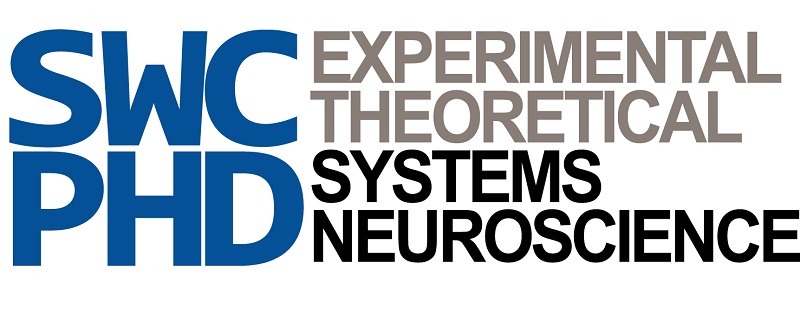
Elena Dreosti and Adam Kampff describe The Last Black Box course for PhD students at the Sainsbury Wellcome Centre. To find out more about the Cajal Programme visit: www.cajal-training.org
SWC PhD Programme Overview
The SWC PhD is a four-year programme. Below is a short overview of each year.
Year one
The first year is centred around courses - Boot Camp, Systems Neuroscience and Theoretical Neuroscience, Experimental Neuroscience, Neuroinformatics - and rotations.
All students begin by attending Boot Camp, a three-week course covering the fundamentals of neuroscience and technology – the things we believe everyone should know before they begin their quest to discover new things. The course, developed in partnership with the Cajal Advanced Neuroscience Training Programme, is centred around a fundamental principle: no “black boxes”.
In short, Boot Camp covers everything from electrons to intelligence and empowers students to build an increasingly sophisticated robot, learning about neuroscience principles and technologies (hardware and software) along the way.
Once the first term begins, students in the SWC and Gatsby PhD programmes together attend Systems Neuroscience and Theoretical Neuroscience, an intensive lecture course in which SWC and Gatsby faculty take turns giving lectures from the angle of their area of expertise.
In parallel with this, SWC students learn advanced experimental neuroscience techniques in a hands-on practical course focused on four areas: experimental design, electrophysiology, optics and microscopy, and data analysis. Here, the first-year students will for example implement a 1,000 channel in vivo recording system, build their own two-photon microscope, and develop a closed-loop behaviour assay.
Year two
Students design a PhD project and begin their research at the start of year two. Supervisors are selected from among SWC or affiliated faculty.
In this year, students also help as teaching assistants in the courses for the new first-year students.
Year three
Third year students write a report and take a viva exam to upgrade from MPhil to PhD. Apart from this, the year is centred on research.
Year four
The last year, students complete their research and make a detailed plan for the time remaining until graduation. They write and submit their PhD thesis and sit a viva examination.
You can access the theses of previous PhD students through UCL Library Services or UCL Discovery.
Across years
All Centre members are invited to participate in journal clubs and learning groups organised by students, post-docs and researchers.
SWC students have access to all that is offered through UCL and the Doctoral School.
Meet some of our students
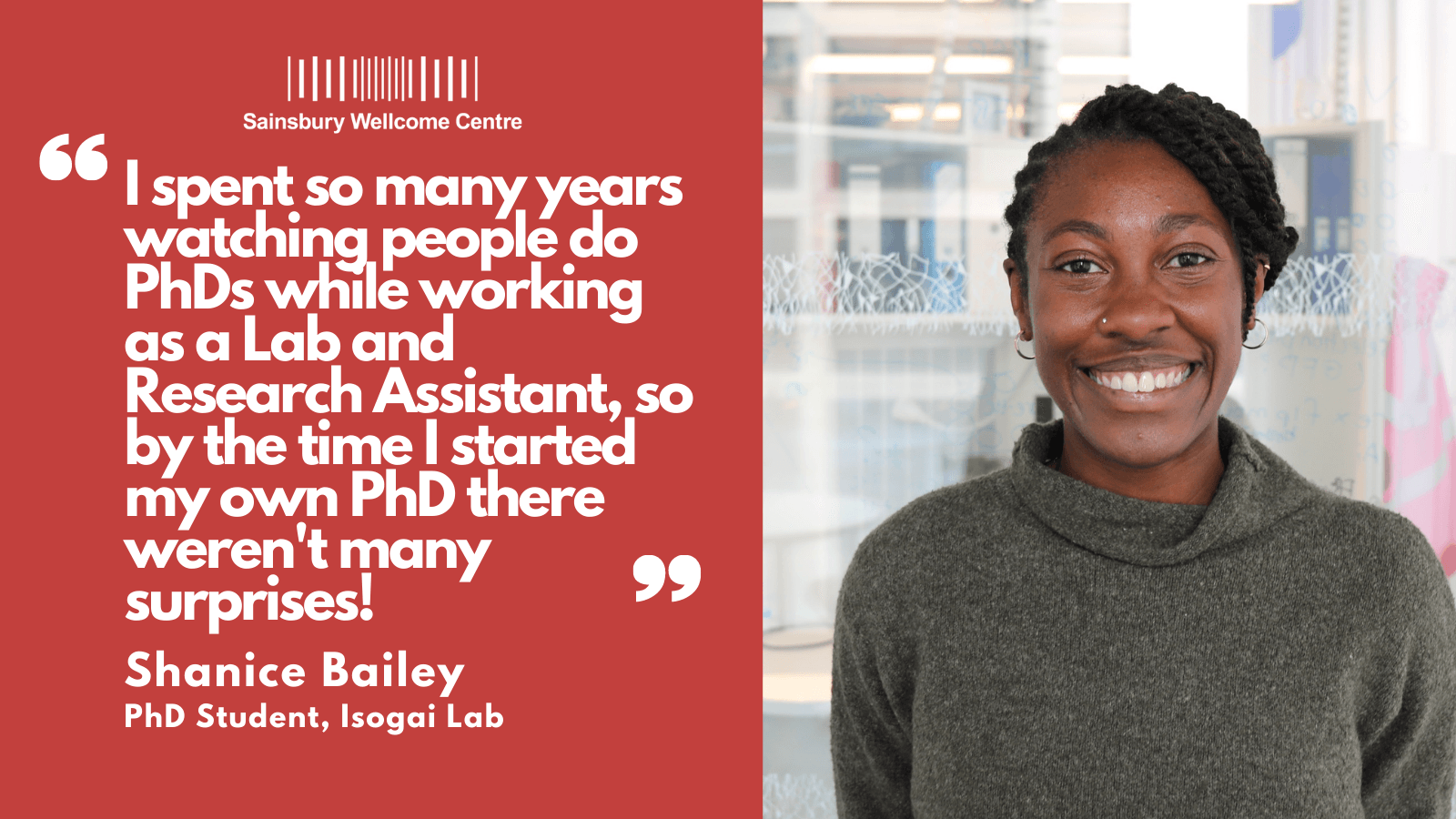
Meet Shanice, a PhD student in the Isogai lab at SWC. Thanks to her previous lab experience at University of Oxford, University of Cambridge and University of Reading, she had few surprises when embarking on her PhD at SWC. Now in her second year, Shanice shares her experience so far and one thing that did surprise her:
“One thing that did surprise me about my PhD at SWC though was just how interdisciplinary it is! I didn’t realise this would stretch to things like electronics and 3D printing. In our optics course, we built a two-photon microscope and for our PhD Boot Camp we even built a robot! I never thought I would get to do these things in a biological PhD.”
Read Shanice’s full story here: Embarking on a PhD in systems neuroscience
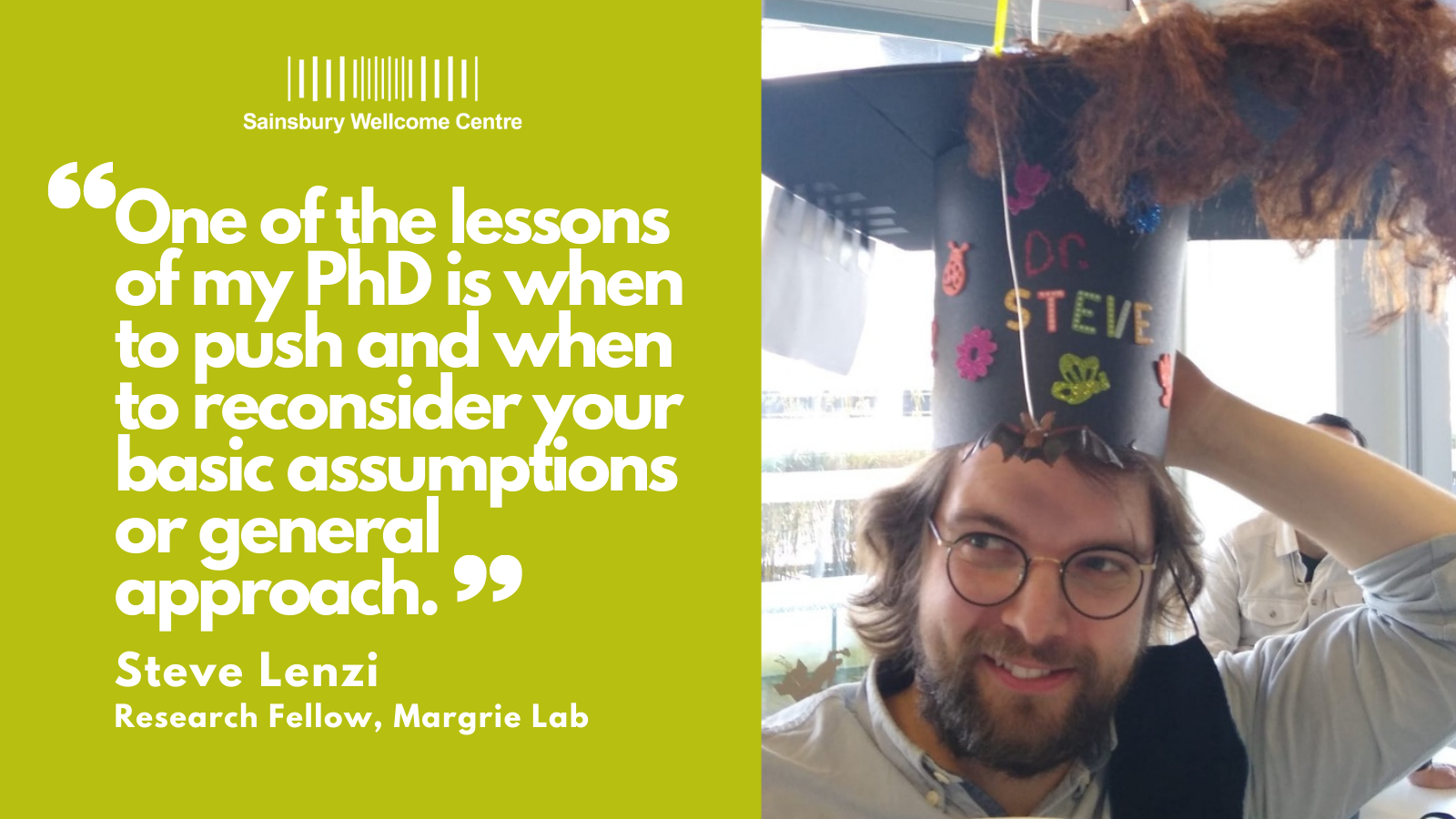
Meet Steve, the first ever SWC student to be awarded their PhD. He shares some of the highlights during his time as a PhD student in the Margrie Lab, some of the hardest parts and also his top tips.
“One of the nice things about finishing my PhD is that I can now devote some time to thinking about what I want to do next. I didn’t spend much of my time during my PhD thinking about next steps. The SWC is a great environment – I don’t have a strong incentive to leave just yet!”
Read Steve’s story here: What is a neuroscience PhD really like?
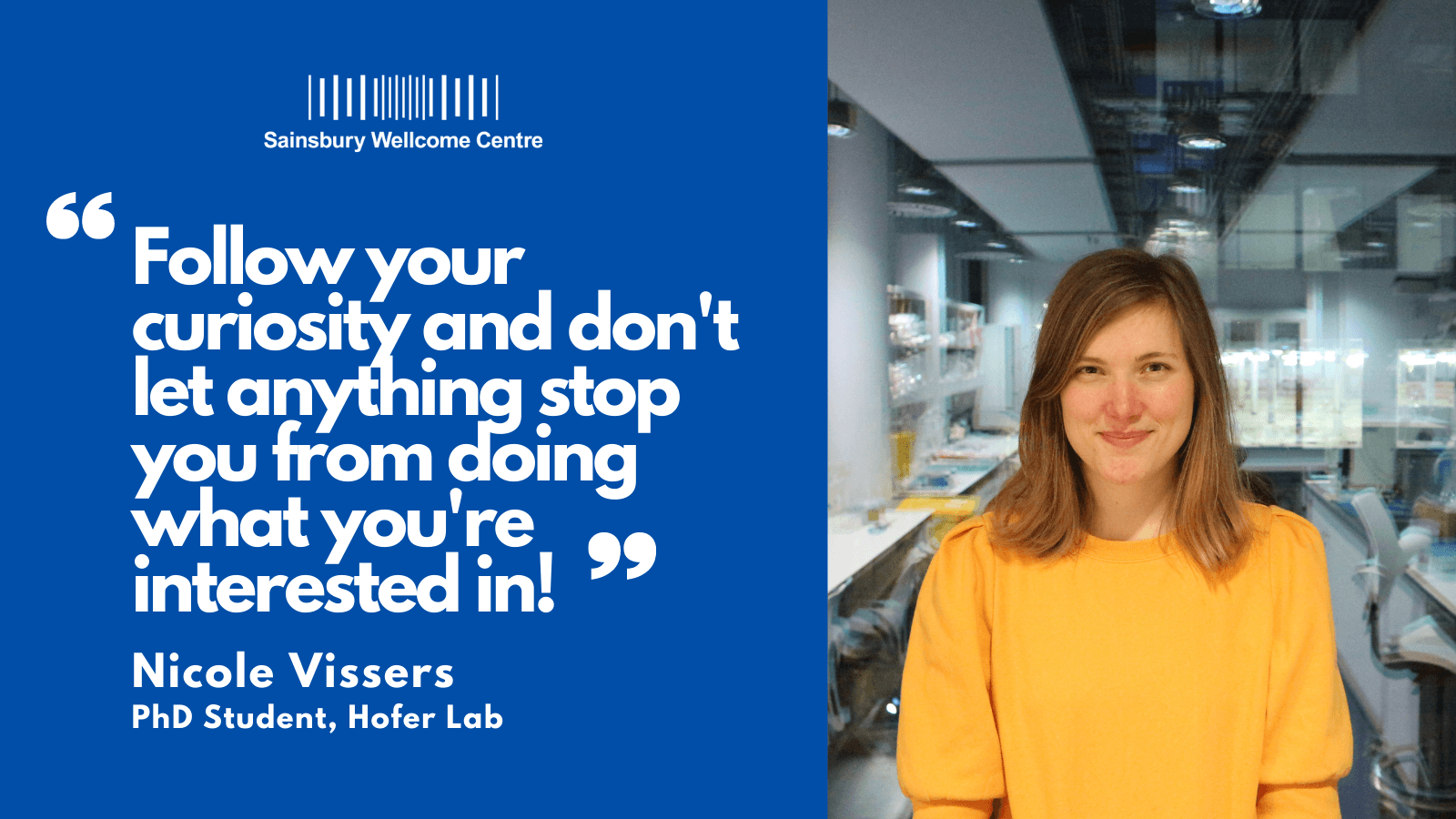
Meet Nicole, a PhD student in the Hofer lab at SWC. She shares her journey in science so far and her advice to those interested in pursuing a PhD in neuroscience, including what being a PhD Student involves day-to-day and some top tips for applying.
“I am a first-generation student as no one in my family ever went to university. I remember when I first started my undergraduate degree, I had no idea what it would be like and I didn’t want to ask questions. I didn’t even know what a PhD was! A PhD involves working on one specific project (for around 3-7 years) and conducting the research yourself. You start out with a research question you are interested in and diverge or focus on a specific topic based on your findings. On top of that, you plan your experiments yourself, with help from your PI and postdocs in your lab.”
Read Nicole’s journey here: Pursuing a PhD in neuroscience
Read about our alumni
Check out our Alumni page to see SWC students that have been awarded their PhDs and their graduate destinations.
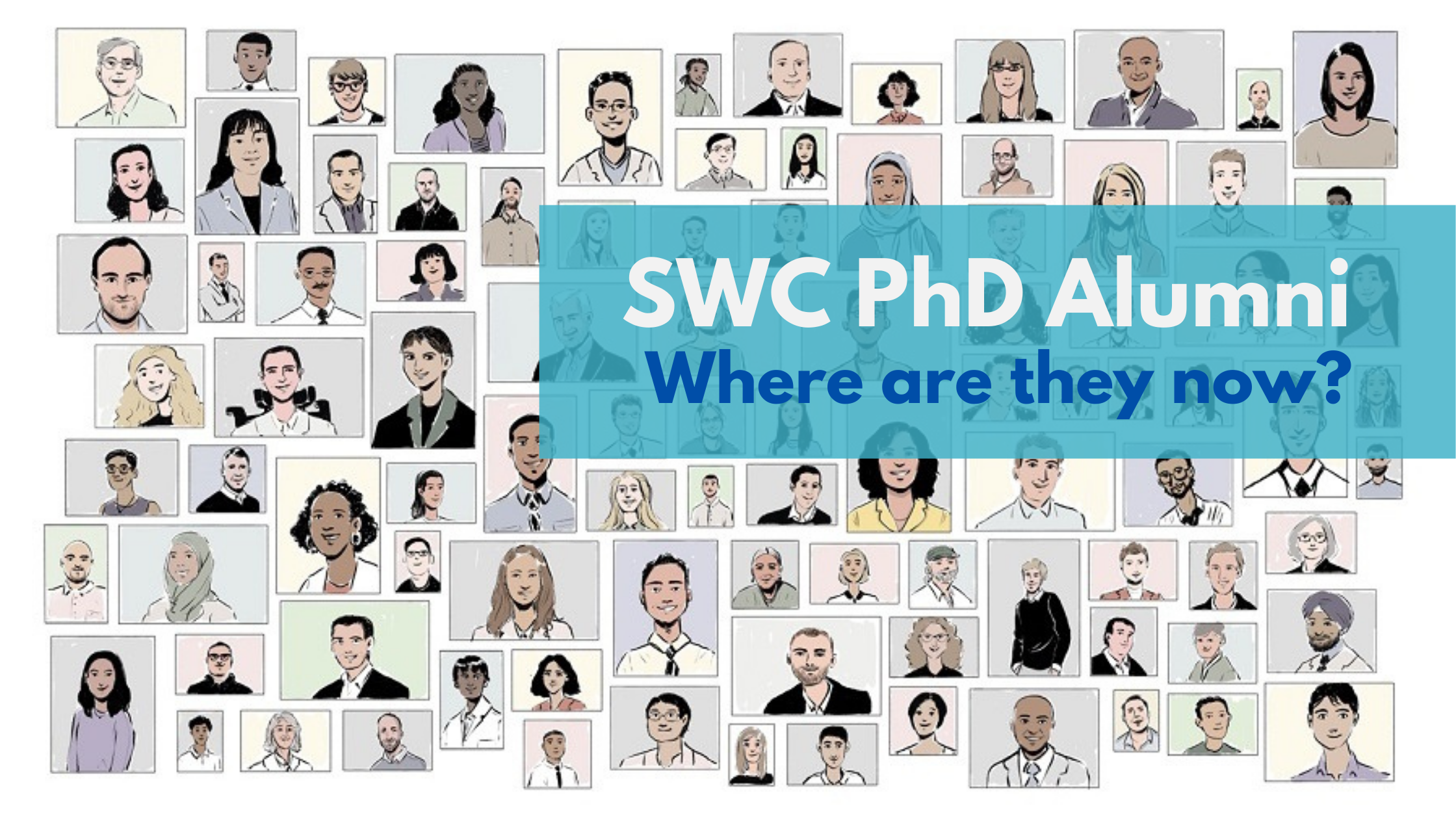
Meet Alex Fratzl, formerly a PhD student in the Hofer Lab at SWC, and now a Postdoctoral research fellow in the Roska Lab at the Institute of Molecular and Clinical Ophthalmology (IOB) in the beautiful city of Basel. He shares how his PhD helped equip him for a career in neuroscience research:
“Given my goal of opening my own independent research lab in the future, the experiences during my PhD helped me to develop scientific, intellectual, and transversal skills needed for succeeding in an academic career.”
Read Alex’s full story here: From a systems neuroscience PhD to a postdoc in visual research
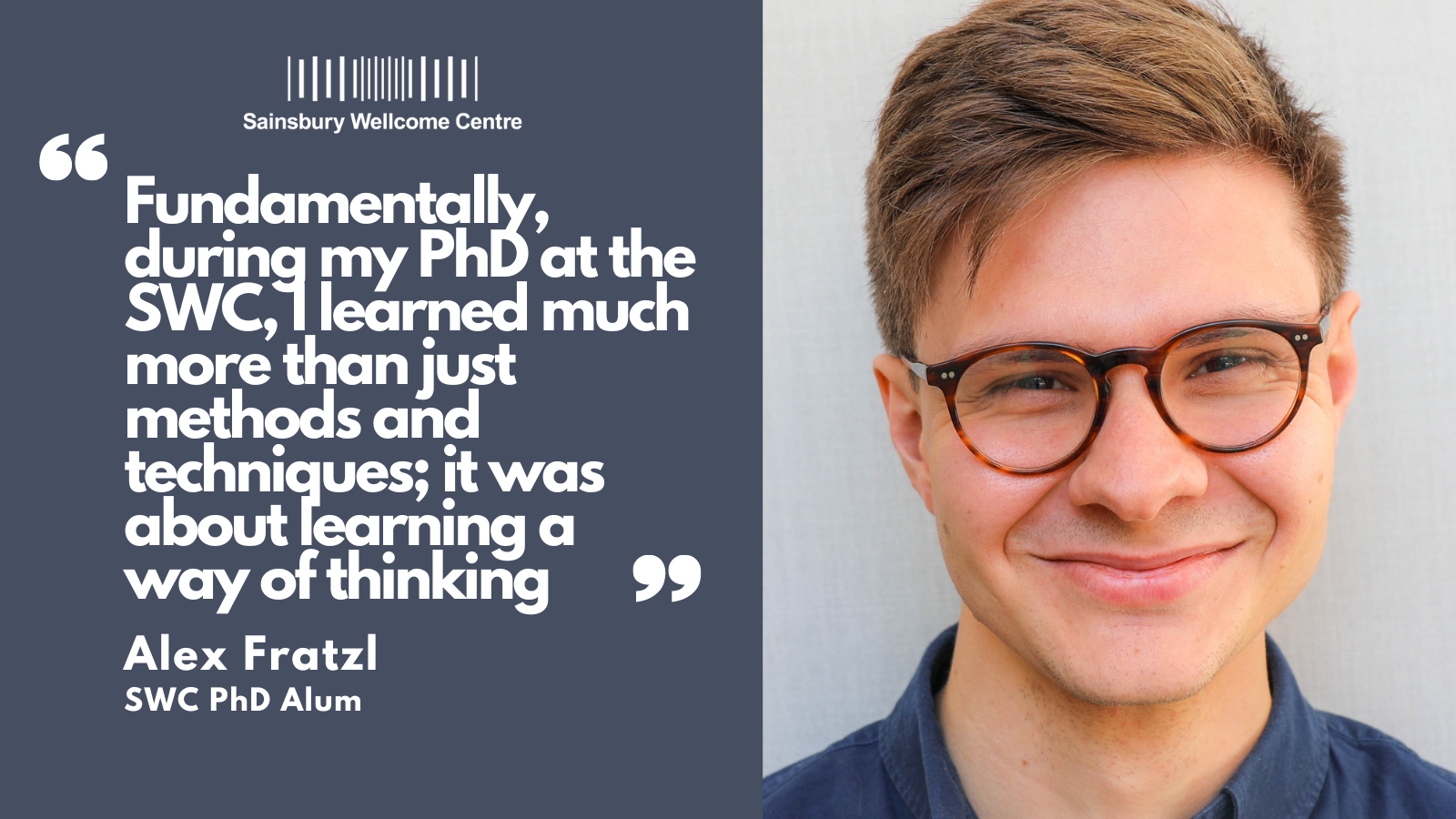
Meet Egzona Morina, formerly a PhD student at SWC, and now Principal Investigator of Environmental Neuroscience Research Incubator (ENRI) at The Xheladin and Xhufe Morina Foundation. She shares her journey - from navigating uncertainty post-PhD to founding a research incubator and developing educational initiatives in Kosovo.
"The PhD at SWC taught me how to think critically, how to structure problems, and how to keep going when things don’t work out. But more than that, it taught me resilience."
Read Egzona's full story here: From PhD to PI: a neuroscientist's mission to map environmental stressors
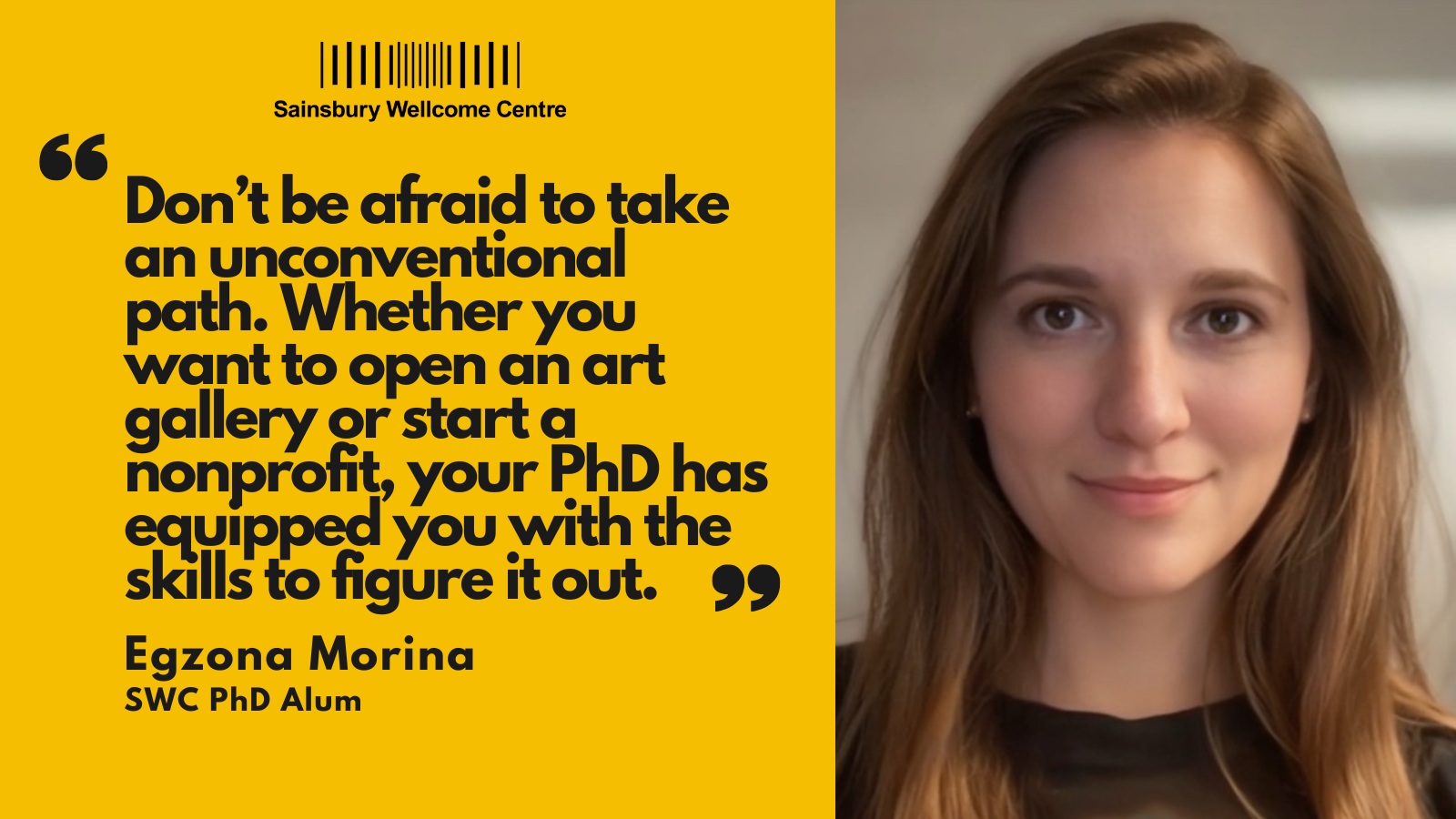
Meet Matthew Phillips, formerly a PhD student in the Branco Lab at SWC, and now Co-founder and CEO at Learney, a start-up building learning software for companies that need help upskilling their employees in new technologies such as data science, machine learning and AI. He shares how his PhD helped him decide to co-found a start-up:
“My PhD helped a lot with this decision because it helped me realised I enjoy working on long-term projects that I have control and ownership over. I really like the feeling that when you get a result in the lab, or build some new software or gain a new customer, it’s your work that has gone into that and my PhD helped me realise that was appealing to me.
Read Matthew’s full story here: From a neuroscience PhD to building software for learning
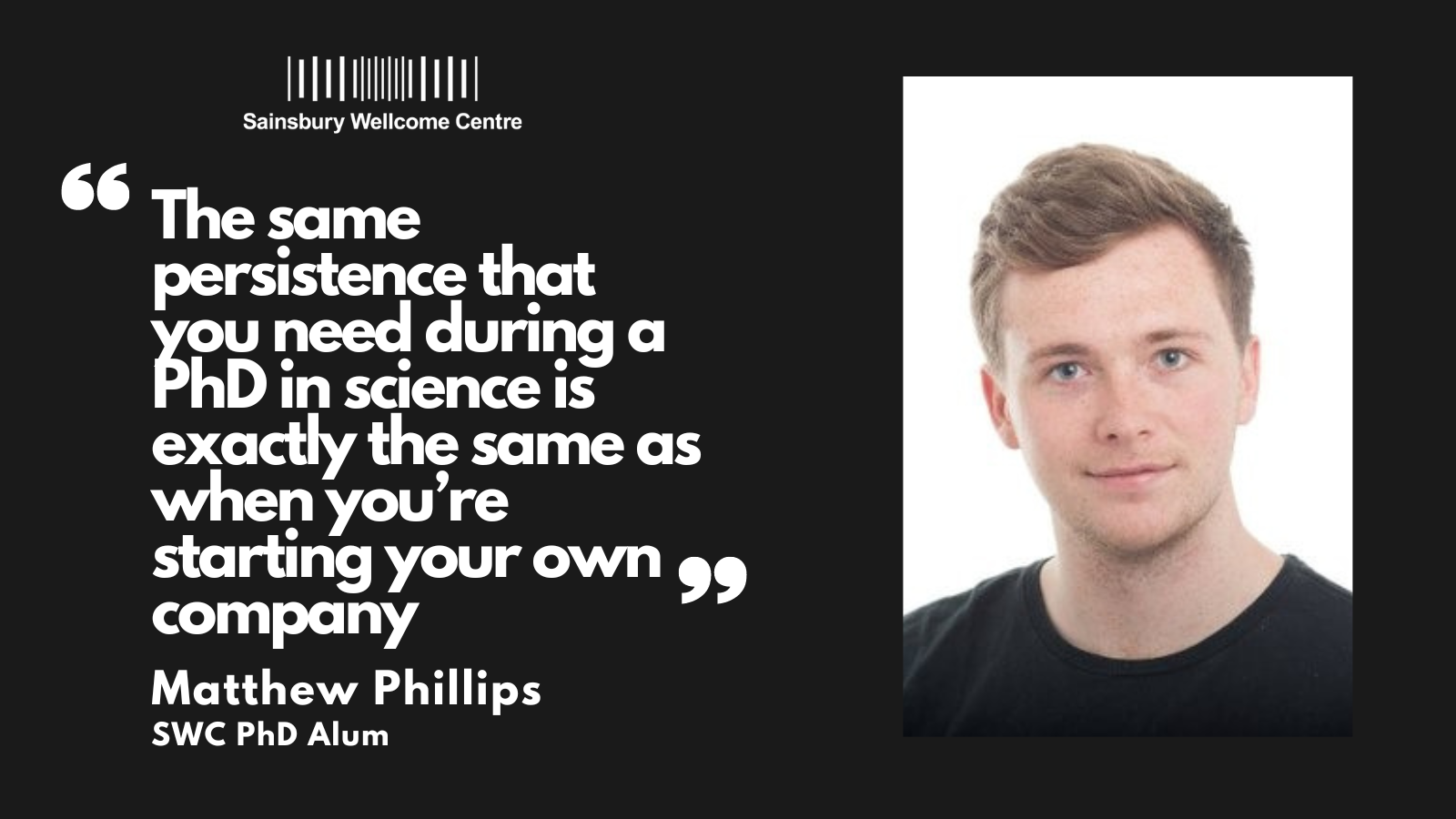
Events
![]()
The SWC hosts a large number of events, some open to the larger community and some specific to Centre members.
SWC Special Lectures
The Centre annually invites a high profile speaker to hold a special lecture. Past invitees include Sir David Attenborough, Professor Frans de Waal, Professor Alice Roberts, and Professor Emily Murphy.
SWC Annual Student-Sponsored Symposium
Each academic year, SWC and Gatsby students organize a day-long symposium, inviting both local and international speakers.
SWC Seminar Series
Each week sees an interesting seminar given by an internationally renowned speaker. Students and postdocs are invited to continue the discussion with the speaker over lunch or coffee.
Emerging Neuroscientists Seminar Series
After an open competition, exceptional early career scientists from around the world are selected to present their work at the SWC in this seminar series.
SWC Lab Meeting
In this weekly lunch time event, a student or a post-doc discusses an ongoing project. SWC Lab Meeting is attended by people at different seniority levels from across the SWC, allowing for a wide range of useful feedback for the speaker.
Tea Hour
Taking place each Friday afternoon, the content of Tea Hour is varied and ranges from broad research talks to game nights and quizzes. Students determine the topic for at least every fourth Tea Hour.
Help and support during your PhD
Doing a PhD is both exciting and challenging. To help students navigate through it all, the structure of the programme is designed to provide several sources of support, both informal and formal.
Fellow students form an inner circle for support and advice. The structure of the first year encourages students to make close connections with in-year peers from both the GCNU and the SWC programme. Together with GCNU students, SWC students organise regular social events and meetings.
The first year, through courses and events, also brings students into contact with a large majority of the Centre community. In addition to introducing students to the research going on in all the groups, this helps students start to build a network.
More formal sources of support inside SWC include the student’s supervisory committee, the Departmental Graduate Tutor, the PhD Programme Coordinator, and our Human Resources staff. In addition, the student wellbeing advisors at our parent faculty, Faculty of Life Sciences, offer in-person or online meetings to students.
Outside the institute and faculty, a wide range of help and resources is available through UCL, the Doctoral School, and the Student's Union.
